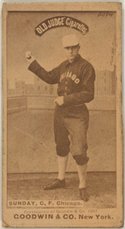Billy Sunday
|
|
Billysunday.gif
William Ashley "Billy" Sunday (November 19, 1862 - November 6, 1935) was noted first as a professional baseball player, and then more famous evangelist.
Born in Ames, Iowa, Sunday grew up the son of a single mother, and the family endured significant poverty during his childhood. His father, also named William, enlisted in the Iowa Infantry Volunteers four months before Sunday was born. He died, a month after Sunday was born, of an unknown disease contracted in Patterson, Missouri while on duty. Sunday's mother was left a widower and mother of three sons. She later remarried and had another son and a daughter.
At the age of 12, Sunday and his older brother were sent to Soldier's Orphanage in Glenwood, Iowa. He ran away from the orphanage two years later and worked for Colonel John Scott in Nevada, Iowa as a stable boy tending shetland ponies. Scott gave Sunday a home and the opportunity to attend school. (The 4-H baseball field in Nevada, Iowa is named the Billy Sunday field.)
Sunday left high school before graduating and moved to Ames, Iowa to play on the baseball team. Shortly thereafter he moved to Marshalltown, Iowa. There he worked at odd jobs: was a runner on a competitive track team and played in the outfield for the local baseball team.
Marshalltown native (and future Baseball Hall-of-Famer) Cap Anson saw Sunday play after being told by the Marshalltown coach that he should come see Sunday play. Anson signed Sunday on to the league-leading Chicago White Stockings. Although Sunday struck out his first thirteen times at bat he was acknowledged to be the champion sprinter of the National League. At one point Sunday raced Arlie Latham, chamption sprinter of the American League, and Sunday beat him by fifteen feet. Sunday played professional baseball for eight years for the Chicago, Pittsburgh, and Philadelphia teams. He experienced a religious conversion in 1887, married Helen A. Thompson in September 1888, and in 1891 he quit baseball to devote his energies to the Young Men's Christian Association (YMCA).
Sunday spent time as an assistant to another evangelist before embarking solo in 1896. He was ordained as a preacher in the Presbyterian church in 1903.
Billy Sunday is most noted for his "fire-and-brimstone" approach to evangelism. Holding a strictly fundamentalist view, he would often preach fiery sermons against political liberalism, evolution, alcohol, and so forth. His energy and vitality won many converts. This in turn led to his accumulating a small fortune through contributions at his sermons. He was one of the first prominent preachers to make use of the new medium of radio.
Sunday is noted as being one of the major social influences leading to the adoption of Prohibition in 1919. As the tide of public opinion turned, he continued to strongly support Prohibition, and after its repeal in 1933, Sunday called for its reintroduction. His popularity waned in his later years, but he nevertheless continued to preach up until his death.
External links
- Selected sermons (http://www.biblebelievers.com/billy_sunday/)
- Listen to several of his speeches (http://www.earthstation1.com/Billy_Sunday.html)
- Revival takes a bite out of crime (http://www.gospelcom.net/chi/GLIMPSEF/Glimpses/glmps110.shtml)
- Huge database of Sunday images and content (http://www.wheaton.edu/bgc/archives/sunday/sunday02.html)
- Billy Sunday's grave (http://www.graveyards.com/IL/Cook/foresthome/se-sunday.html)
References
- Nevada Community Historical Society, Inc. (2003). Voices from the Past: The Story of Nevada, Iowa, Its Community and Families. Unknown press (Nevada Community Historical Society, Inc., PO Box 213, Nevada, Iowa 50201-0213; 515-382-6684)

